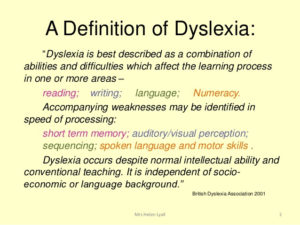
From my experience, one of the best writers I have worked with was dyslexic. Yet, they doubted their own writing ability! Their ideas were clearly expressed, uniquely expressed, and while there were some errors in spelling and word selection… Wow! This person could write. So I wanted to share a few things to dispel the myth that people with dyslexia can’t write. It isn’t true!
To start with, I have to confess something. Dyslexia isn’t about writing at all. It’s about a combination of skills which affect the learning process. And the term for those who “cannot write” is called dysgraphia. Symptoms are similar so they often occur together.
Myth 1: Dyslexics can’t write
Fact: those with mild to moderate dyslexia can read and write.
Education is key for people to learn writing strategies. Think of dyslexia as a different way of thinking that requires a supportive learning environment. For example, I’ve written about how storytelling and education go together in Young People, Learning & Storytelling. Where the confusion about this might have arisen is that a person might have slower than average reading skills, and spelling can be tricky but many people without dyslexia contact me all the time for help with their spelling.
Myth 2: Writing letters backwards is a main sign of dyslexia
Fact: It’s common for all young children to reverse letters.
I’ve been known to switch whole words in sentences; perhaps you do this yourself or know someone who does? It’s something that can happen to anyone. At a later stage, if a child is still reversing letters an evaluation might be required. However, not all kids with dyslexia write their letters backwards and some don’t at all.
Myth 3: Kids with dyslexia just need to try harder to write
Fact: How young people are taught makes the difference, to help students gain invaluable reading and writing skills.
Using a word like ‘effort’ is a bit of a red herring. Research has proven that kids with dyslexia think differently because their brain functions differently. So it makes sense to use a different teaching approach. You might have heard of the multisensory approach for example, which uses sight, touch and sound.
We know some remarkable things about reading; it can change the brain over time, and reading about scents and tastes triggers parts of the brain related to when we really smell or taste something.
Myth 4: There is no “cure” for dyslexia
Fact: Dyslexia is not a disease.
Difficulties with spelling, tend to be obvious very early on. A child can spend hours working each night on a spelling list for a test, and pass the test … then they might have difficulties spelling the same words when writing sentences. With specialist teaching, dyslexics can successfully learn to improve their spelling. Reading and spelling are closely related skills so strategies usually focus on both.
Myth 5: Dyslexics are “gifted” or ”stupid”
Fact: There is little relationship between dyslexia and intelligence in young children.
Dyslexia occurs across a whole spectrum of intelligence levels — if we agree in the way that intelligence is rated in the first place! So dyslexia is as likely to be found in those we label as “gifted” and “talented” as it is present in those labelled “low-ability”. Most dyslexics fall in the middle with the rest of the population. However, if dyslexics don’t learn to read, as they get older they may fall behind the national average, so again we return to the conundrum of education and why we don’t have adequate policy in place to ensure all children’s needs are met. But that is a topic for another post.
Who is Emma?

Emma is a proofreader with 18 years of writing experience with businesses, academics and creative writers. She obtained a Creative Writing MA (St Andrews University) and a PhD in Storytelling (Warwick University). Then set up her own proofreading business and became a published author of fiction as well as academic literature such as Young People, Learning & Storytelling (Palgrave Macmillan).



2 Comments
x · 7 June 2022 at 15 h 04 min
” Dyslexia is not a disease.” in the same way that loosing a leg or blindness is not a ‘disease’ but they don’t have a ‘cure’ either. Belive me it’s perminant its not going away and it’s going to shame and follow you around for life and there is nothing you can do to stop it ( like loosing ) a leg. So there is no cure. There are only coping strategies
Emma Parfitt · 9 June 2022 at 11 h 37 min
Exactly, and there are multiple copying strategies out there, thankfully. It’s so great to see increased levels of support and reasearch available.